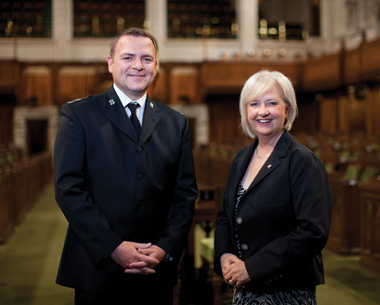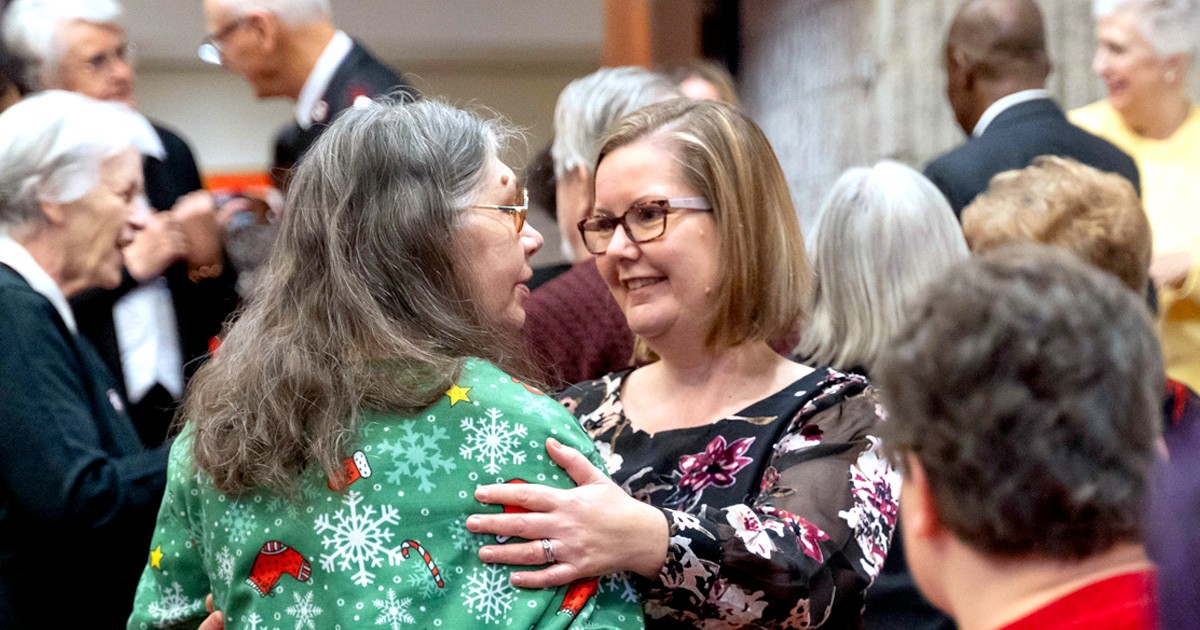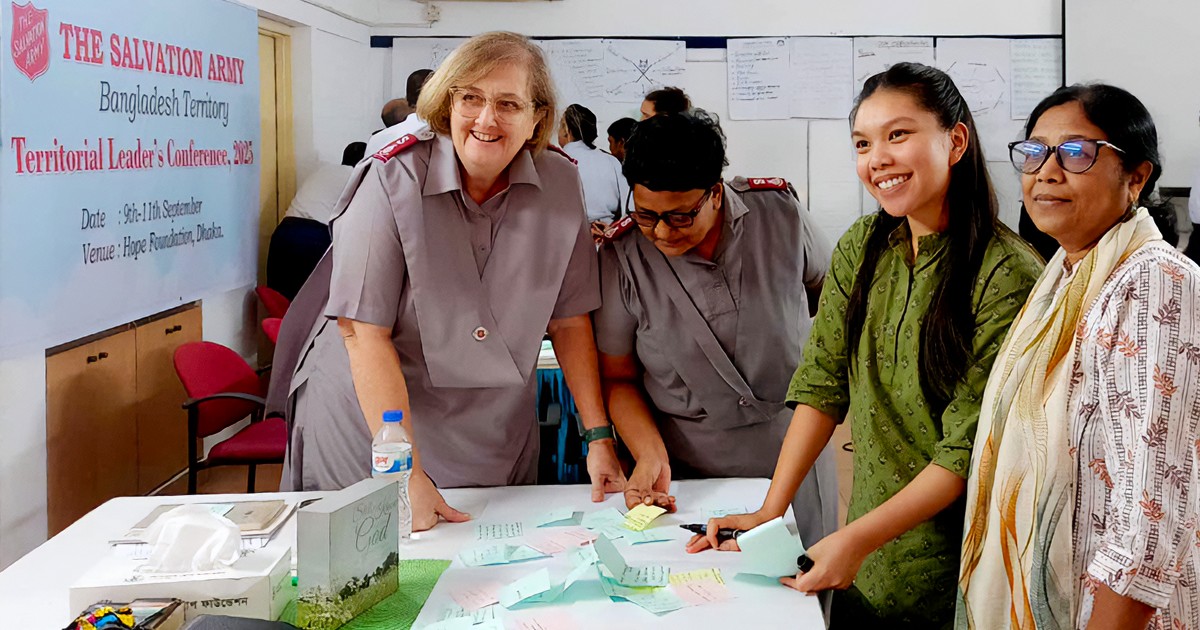 Only 20 years after the Movement was founded, The Salvation Army became embroiled in one of the most groundbreaking political actions of its time. Fuelled by the desire to eliminate child prostitution, a petition containing 343,000 signatures was presented to the British government by Salvationists in 1885. As a result, the age of sexual consent increased from 13 to 16.
Only 20 years after the Movement was founded, The Salvation Army became embroiled in one of the most groundbreaking political actions of its time. Fuelled by the desire to eliminate child prostitution, a petition containing 343,000 signatures was presented to the British government by Salvationists in 1885. As a result, the age of sexual consent increased from 13 to 16.
More than 125 years later, the Army continues to be active in politics. Its views are regularly voiced on Parliament Hill in Ottawa by Michael Maidment, who is the area director for public relations and development in the National Capital Region and the federal government relations officer.
“I'm the guy on the street, so to speak,” explains Maidment. “I'm the one attending meetings, making presentations and building relationships with MPs, bureaucrats and parliamentarians. However, I depend on others in the organization for research and assistance. I might call upon an expert in the THQ social services department, talk to someone in a ministry unit or liaise with a divisional commander.”
Maidment's presence in the National Capital Region enables him to follow upcoming legislation. In addition to networking and participating in meetings, he scans four daily newspapers and various social media sites such as Twitter to see what priorities and policies are up for discussion in parliament and committee meetings.
“A few years ago, the Consumer Safety Act was created in response to the large number of toy recalls and food safety issues,” Maidment explains. “If the act was enforced as originally written, we would have had to collect data on all donations made in thrift stores across the country—something we wouldn't have been able to comply with. After the issue was identified by our territorial legal department, we wrote to the Health Minister and chair of the House of Commons health committee, and met with senior officials in the Health Department and Prime Minister's Office. The end result was that our concerns were heard and the proposed regulations changed to exempt us and other similar charities from the reporting requirements contained in the legislation.”
Responding to issues that could affect the Army is only part of Maidment's role. Sometimes, parliamentarians or house or senate committees will phone Maidment for the Army's perspective on an issue, such as what the impact of eliminating the penny would be on the charitable sector.
“As well, issues such as human trafficking, human rights, poverty, homelessness and affordable housing are mainstay issues and we adopt a longer-term focus on those,” Maidment says. “They are priorities for our organization regardless of what government is in office.”
The emphasis on human trafficking, in particular, emerged from a request that General Shaw Clifton (Rtd) made several years ago. As a result of a common interest, the Army's government relations representatives developed a strong connection with Joy Smith, a member of Parliament for Kildonan-St. Paul,Winnipeg.
“MP Smith has an incredible passion for this issue and has advocated for the government to take more action,” says Maidment. “With input from Dianna Bussey, the Army's social services consultant on human trafficking, Joy has proposed a national strategy on human trafficking. Within that, The Salvation Army is listed as an organization that should benefit from government investment in victim services. God is at work in Parliament and I see MP Smith as a person who not only has Christian faith, but displays it.”
The issue of commercial and sexual exploitation of children and youth is also being addressed by the Army. Maidment participates in relevant committees, some of which are headed up by Senator Roméo Dallaire, retired lieutenant-general, who served as a commander for the United Nations during the Rwanda genocide.
“I recently made a presentation to the standing senate committee on human rights, which at the time was examining the issue of sexual exploitation of children and youth,” Maidment adds. “I shared The Salvation Army's experience in combatting this evil and some of our thoughts as an organization about what could and should be done.”

Advocating for Our Clients
Although Maidment actively forms relationships with government officials and participates in various committees, The Salvation Army maintains an apolitical stance.
“Our ultimate concern is for the people we serve,” he asserts. “And their concerns are what we pay particular attention to in politics; mostly, it comes down to giving clients hope and dignity. And just as we serve anyone who needs our help and care—no matter what their circumstances—we work with all parliamentarians no matter what their political stripe or who is in power. Our priorities as an organization don't change when the government changes.”
However, the shift to a majority government, as happened in the most recent election, does influence The Salvation Army's ability to make change.
“I think that the government will now take a longer-term focus and we'll probably see more willingness to tackle issues that are a little less popular or more complex,” says Maidment. “We are also likely to see the government focus on growing the economy and reducing the deficit, which could be a concern for us as money to develop new programs to address our key areas of interest, such as affordable housing, could be limited.”
In these situations, or when important changes fought for do not occur, frustration and cynicism can develop. Nonetheless, Maidment says, “We, as Salvationists, are compelled to be involved in politics on behalf of the 1.6 million people who needed our care last year.
“Throwing our hands up and saying, 'It's too difficult; they're not listening' isn't how we operate. I don't think that's something the Founder would have done. William Booth would have continued to press forward and look for a new way to influence change,” he continues. “And then, there have been times when I've sat in committees, given a report on behalf of the Army and seen the recommendations accepted. It's incredible when that happens.”
Recognition in Parliament
Maidment's work in Ottawa offers him the privilege of hearing comments about the Army's work. In one particular meeting with Governor General David Johnston and Commissioners William and Marilyn Francis, former territorial leaders, the Governor General commented: “The Army helps people when other people fail…. The Army is always there.”
“I thought that was very kind and special, and representative of several comments I've heard on the federal stage,” Maidment reflects. “Part of our strategy across Canada is to have local and federal politicians involved with The Salvation Army in their communities. As a result, when they're on Parliament Hill, many speak highly of what The Salvation Army is doing locally.”
When The Salvation Army's Dignity Report was released in March, it received national media attention. Highlighting that one in 11 Canadians live in poverty, the report was immediately deemed relevant by government members.
“Two days after the report came out, an MP walked into a meeting with a copy,” shares Maidment. “I was congratulated on The Salvation Army's behalf for releasing the report, which dispelled some of the myths about poverty. It was positively received and there was general recognition among MPs that more needs to be done on this issue.
“This is also an area where Salvationists can encourage the government to continue to improve. We've become so global that sometimes we forget the issues that need our attention in our local communities. As Mother Teresa said, 'In your own neighbourhood there is a family who needs your care and love.' I believe those words capture the essence of The Salvation Army's mission: to be a transforming influence in the communities in which we serve. Transformation begins with helping one child, caring for one family, writing one letter or speaking at one public meeting.”
Beyond the Election: How You Can Impact the Government
• Have your voice heard by making a phone call or writing an e-mail or letter to your local politician. Organize and encourage your family, neighbours and friends to do likewise.
• Join advocacy groups that focus on issues important to you, such as homelessness, human trafficking, affordable housing or the exploitation of children and youth.
• Educate yourself so that when elections occur, you know who you want to vote for. Read up on issues that you care about and see what stance political parties are taking.
• Speak out on behalf of the marginalized in your community.










Leave a Comment